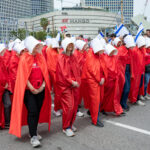Summary: A brief scan of some of the events of May Day 2023, around the world — Editors
May Day, International Workers’ Day, has been a day of celebration and protest since 1890.
This year, the need for higher wages to compensate for steep rises in the cost of living was a pressing issue in many countries, while demands for shorter hours of work, greater job security, and for workers to be treated with respect remained important as ever.
The following are just a few of the events of May Day 2023 around the world.
In Hong Kong, where most civil liberties have been crushed by the Chinese state, two small gatherings, called by the Hong Kong Women Workers’ Association and the League of Social Democrats, were held under heavy restrictions, calling for an increase in the minimum wage and standard working hours. Joe Wong, former chairperson of the dissolved Hong Kong Confederation of Trade Unions, had applied as an individual for a permit to call a rally, which he later withdrew, apparently after heavy pressure from the police.
In Indonesia, workers protested a so-called Job Creation Law, which benefits corporations at the expense of workers and the environment.
In the Philippines, unions protested the brutal murder a few days earlier of Alex Dolorosa, a union organiser and advocate for the rights of workers and LGBTQI+ people, and many similar acts of murderous violence against labour and social activists. According to the yearly Global Rights Index produced by the International Trade Union Confederation (ITUC), the Philippines is one of the worst countries for working people, with over 50 trade unionists killed since Rodrigo Duterte became president in 2016. The violence and intimidation continue under Ferdinand Marcos Junior.
In Istanbul, Turkey, the government would not allow marchers to enter Taksim Square, a memorial site for the labour movement, where a massacre of workers took place in 1977. When protesters tried to enter the square in defiance of the ban, there were clashes with the police, and 164 people, including journalists reporting the event, were detained.
In Skopje, the capital of Northern Macedonia, one of the poorest countries in Europe, unions protested a 78 percent rise in government ministers’ salaries.
In France, the First of May was a continuation of the struggle against Macron’s attempt to raise the age of retirement from 62 to 64. The French working class is defending an advanced position. Although images of petrol bombs and fireworks versus tear gas and water cannon dominated the media, over a million people marched in peaceful but determined demonstrations.
In Brazil, where the politically organized working class is more or less in tow of Lula’s government, the 1st of May was formed by a group of union federations, from the CUT, which is the union arm of the PT and the current government, to Força Sindical, that historically has served capital. Thousands of people gathered in the main Brazilian cities, but the spirit of the meeting was the idea of class conciliation, which can be summarized in the following excerpt from Lula’s speech when announcing the 18 real (less than 5 dollars) increase in the minimum wage:
“When the minimum wage increases, it is not just the worker who earns the minimum that benefits. Because having more money, the worker buys more. The market will generate jobs and will order things from industry. Industry will generate jobs and the giant wheel of economics starts to turn. Even the richest gain from raising the minimum wage,” he said.
(Thanks to Rodrigo Pinho for the report from Brazil).
My own May Day activity was taking part in a Zoom meeting held by the Ukraine Solidarity Campaign. Two members of Ukraine’s Confederation of Free Trade Unions spoke to supporters, mainly in Britain, with some comrades joining us from the United States.
Speaking from Ukraine, Tatyana, a teacher, described the impact of the war on education as “an awful new reality”. 438 schools have been destroyed, three thousand damaged, and nearly eight hundred are in Russian-occupied territory. Teachers are working to provide a safe and comfortable learning environment for pupils. This involves lots of after-school clubs and activities, and monitoring the mental health of children, especially those from the occupied territories. The previous week, she went to the funeral of a former pupil who had died in combat, aged 26.
Oksana introduced herself as a union lawyer living in Britain with her children since the invasion, though she had been back to Ukraine to visit her parents. Many people have been killed in the workplace, or left with disabilities, by missile strikes. Everyday life is difficult because of the rise in prices for food, medicine and other necessities.
The speakers thanked the Ukraine Solidarity Campaign for its support and told us “Don’t get tired”.






0 Comments